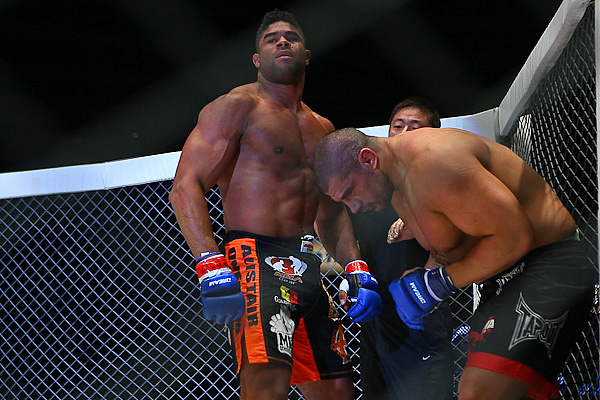Drug Testing Becomes Focus in Overeem-Rogers Bout
Loretta Hunt May 12, 2010

File Photo: Sherdog.com
Returning Strikeforce heavyweight champion Alistair Overeem hasn’t exactly been welcomed back to the U.S. with open arms amidst accusations that he’s taken performance-enhancing drugs to enhance his noticeably thicker frame.
Advertisement
The 6-foot-4 Dutch striker made strides as a light heavyweight entry in Japan’s Pride Championships for five years before deciding to resume his career at heavyweight. Overeem came in at 224 pounds against Buentello in 2007; by 2009, he is said to have weighed more than 260 pounds, leading fans worldwide to dub him “Ubereem.”
Overeem’s two-year spell abroad, where drug testing is often not
overseen by regulatory agencies and widely overlooked by
promotions, fueled talk that the Golden Glory fighter was avoiding
his obligations in the States, where he knew he would be
tested.
Rogers, who’s campaigned with Strikeforce for the opportunity to fight the champion for over a year, has voiced his concerns about Overeem’s larger physique, often referring to the Dutch fighter’s regimen as his “Eastern diet.”
“I’m a big guy myself, but I know I’m not going to blow up that much in that short amount of time,” said Rogers. “It’s questionable to me. Hopefully, the athletic director and the commission can resolve that.”
Tim Lueckenoff, commissioner for the Missouri Office of Athletics, said the regulatory body will test for “all illegal and unprescribed drugs.” Lueckenoff refrained from discussing the drug testing timetable (pre-, post-fight or both) or what type of testing will be done per the agency’s testing protocol. The state athletic agencies that do test normally utilize urinalysis sampling, which can detect the presence of steroids and other drugs of abuse, but doesn’t account for the synthesized Human Growth Hormone (HGH).
However, recent media attention surrounding boxer Floyd Mayweather Jr.’s insistence that Manny Pacquiao conform to more sensitive blood testing procedures before greenlighting their much-anticipated mega-fight has shone the light on testing protocol in all combat sports. The New Jersey State Athletic Control Board is the only U.S.-based commission to employ random blood testing for MMA and boxing, which it began in June 2007. However, other agencies are now exploring the testing as well. The Nevada State Athletic Commission has said it is considering it for both combat sports, possibly this year.
Overeem and Rogers said they’d comply with whatever type of testing is instituted surrounding Saturday’s bout. Surprisingly, the Holland-based fighter said he hasn’t been bothered by Rogers’ and others insinuations, adding that his negative test will absolve him.
“People can say what they want. People can say what they think. I’m going to have to pee just like Brett is going to have to pee just like all the other (fighters) are going to have to pee. Then that pee will be tested,” said Overeem.
Overeem, who turns 30 on Monday, said his decision to move up a division marked a rational progression in his fight career.
“I’ve always been a natural heavyweight,” he said. “I was always running around at 100 kilos (220 pounds).”
With his Pride debut in Japan, Overeem said he had to decide whether to keep the weight and possibly tangle with more than a few opponents who were heavier than him, or cut down to the light heavyweight ranks. Overeem chose the latter.
“In the beginning that worked really well. It didn’t cost me any power,” said Overeem, “but as you grow older, you go a little bit stronger, more heavy and I had problems cutting the weight.”
Following losses to Mauricio "Shogun" Rua and Sergei Kharitonov in 2007, Overeem decided he’d rather shed the diet than the pounds.
“I’d fought everybody at light heavyweight in Pride at the time, so for me it was a very logical decision to go to heavyweight (with) a whole bunch if new opponents.”
Overeem said his speed and conditioning hasn’t suffered with his gain in size.
“In my opinion, heavyweights are less technical, less fast, less conditioning then light heavyweight, so I was thinking if I could keep the speed, keep the technique, keep the conditioning from light heavyweight to heavyweight, than I’d be a dangerous fighter,” he said.
And though his Strikeforce homecoming hasn’t been embraced by all, Overeem said his focus is completely placed where it should be, on his opponent Rogers.
“I know (the test’s) going to be negative,” he said. “Then all the people that are still talking will shut up.”
This article was updated at 2:35 p.m. EST to reflect that the NJSACB is the only U.S.-Based regulatory body to conduct random blood testing for both MMA and boxing.
Related Articles






